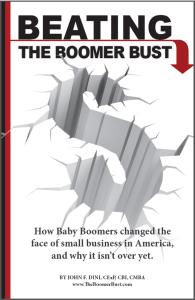Your ExitMap Blog gathers contributions from top exit planning professionals across the country that are indexed into four categories. They include select strategies for planning your exit, ideas for building your company’s value, transfer options you can choose from, or preparing to enjoy your post-exit lifestyle. This page shows the most recent posts from Your ExitMap Blog. If you are seeking a qualified exit planning professional, you can view a map of specialists here.
All articles are copyrighted by the authors, and reprinted here with permission. Each author’s contact information is available via a link at the end of the article.
Most Recent Your ExitMap Blog Articles
Most Recent Blog Articles
The Third Entrepreneurial Sin -- Sloth This week we begin discussing the tactical sins. They are those habits of a business owner that impact day-to-day operations; Sloth, Wrath and Greed. To read this series from the beginning, start here. Few business owners would acknowledge that they suffer from Sloth. Most work very hard. To paraphrase an old New Yorker cartoon, “The thing I like best about self-employment is that I can make my own hours. I’ve chosen to work 24 hours a day.” (Also, see Lust.) Sloth in your business isn’t a disinclination to put in the effort. It’s the sin of settling for “good enough.” If your sales are flat, margins are ... Read more This week we begin discussing the tactical sins. They are those habits of a business owner that impact day-to-day operations; Sloth, Wrath and Greed. To read this series from the beginning, start here. Few business owners would acknowledge that they suffer from Sloth. Most work very hard. To paraphrase an old New Yorker cartoon, “The thing I like best about self-employment is that I can make my own hours. I’ve chosen to work 24 hours a day.” (Also, see Lust.) Sloth in your business isn’t a disinclination to put in the effort. It’s the sin of settling for “good enough.” If your sales are flat, margins are ... Read more The Second Entrepreneurial Sin - Gluttony This is the third in our series about The Seven Deadly Entrepreneurial Sins. You can start from the beginning here. Gluttony is the second of the Operational Sins; those that reduce your personal effectiveness as an owner and the leader of your company. There are a number of indicators that you might be guilty of Gluttony. You are the first person to arrive every morning You’re the last one to leave at night You work weekends, but your employees don’t Your “to do” list can’t fit on one sheet of paper Even when you use columns You only work on the next deadline All of the above ... Read more This is the third in our series about The Seven Deadly Entrepreneurial Sins. You can start from the beginning here. Gluttony is the second of the Operational Sins; those that reduce your personal effectiveness as an owner and the leader of your company. There are a number of indicators that you might be guilty of Gluttony. You are the first person to arrive every morning You’re the last one to leave at night You work weekends, but your employees don’t Your “to do” list can’t fit on one sheet of paper Even when you use columns You only work on the next deadline All of the above ... Read more The First Entrepreneurial Sin - Lust Last week we described the Seven Deadly Sins of an Entrepreneur. This week, we’ll delve into the first Operational Sin; Lust. The Operational Sins reduce your personal effectiveness as a business owner. They prevent you from being as operationally effective, on a day-to-day basis, as you could or should be. If you aren’t efficient in your leadership role, it cascades down through your whole organization. Lust is the sin that springs from a lack of self-control. As an owner, few people in your business (if any at all) say no to you. They ask, “Boss, did you do that really important thing you were supposed to do ... Read more Last week we described the Seven Deadly Sins of an Entrepreneur. This week, we’ll delve into the first Operational Sin; Lust. The Operational Sins reduce your personal effectiveness as a business owner. They prevent you from being as operationally effective, on a day-to-day basis, as you could or should be. If you aren’t efficient in your leadership role, it cascades down through your whole organization. Lust is the sin that springs from a lack of self-control. As an owner, few people in your business (if any at all) say no to you. They ask, “Boss, did you do that really important thing you were supposed to do ... Read more The 7 Deadly Sins of an Entrepreneur The Seven Deadly Sins are alive and well in small businesses today. Far from being a hoary religious holdover from the Dark Ages, they are practiced assiduously by entrepreneurs everywhere. There is something to be said for any concept that catches the public imagination for fifteen centuries. First postulated by Saint John Cassian around 400 AD, the sins were codified by Pope Gregory the Great in the late sixth century, and popularized by Dante Alighieri in “The Divine Comedy” in 1315. They remain present on a daily basis in many businesses through the 21st century, 700 years on. The Seven Deadly Sins are Lust, Gluttony, Sloth, ... Read more The Seven Deadly Sins are alive and well in small businesses today. Far from being a hoary religious holdover from the Dark Ages, they are practiced assiduously by entrepreneurs everywhere. There is something to be said for any concept that catches the public imagination for fifteen centuries. First postulated by Saint John Cassian around 400 AD, the sins were codified by Pope Gregory the Great in the late sixth century, and popularized by Dante Alighieri in “The Divine Comedy” in 1315. They remain present on a daily basis in many businesses through the 21st century, 700 years on. The Seven Deadly Sins are Lust, Gluttony, Sloth, ... Read more Not Just Workers...Qualified Workers A few weeks ago I attended one of Trinity University’s Policy Maker breakfasts. Although living in a large city has its drawbacks, it is great for access to events such as these. It takes substantial ticket sales to justify top-rank speakers, and Trinity’s series brings the best. The speaker was Richard W. Fisher, immediate past President and CEO of the Federal Reserve Bank of Dallas, as well as almost 11 years on the Federal Open Market Committee, where he voted on monetary policy under Alan Greenspan, Ben Bernanke and Janet Yellen. In Q&A time, I had the opportunity to ask how he could project robust growth ... Read more A few weeks ago I attended one of Trinity University’s Policy Maker breakfasts. Although living in a large city has its drawbacks, it is great for access to events such as these. It takes substantial ticket sales to justify top-rank speakers, and Trinity’s series brings the best. The speaker was Richard W. Fisher, immediate past President and CEO of the Federal Reserve Bank of Dallas, as well as almost 11 years on the Federal Open Market Committee, where he voted on monetary policy under Alan Greenspan, Ben Bernanke and Janet Yellen. In Q&A time, I had the opportunity to ask how he could project robust growth ... Read more Is Your Business in the "Neutral Zone?" As Baby Boomers business owners approach retirement (the youngest of them turned 50 this year) they face a unique challenge. The market for small businesses is increasingly a buyer’s smorgasbord A shrinking middle-aged population, corporate competition for talent and less interest in the long hours associated with many traditional small businesses combine to make selling many Boomer enterprises a more difficult proposition. The best-of-class companies on both the smaller and larger end of the spectrum will still stand out as appealing propositions to buyers. On the main street side (companies selling for less than $3 million or so) there are still plenty of aspiring entrepreneurs who ... Read more As Baby Boomers business owners approach retirement (the youngest of them turned 50 this year) they face a unique challenge. The market for small businesses is increasingly a buyer’s smorgasbord A shrinking middle-aged population, corporate competition for talent and less interest in the long hours associated with many traditional small businesses combine to make selling many Boomer enterprises a more difficult proposition. The best-of-class companies on both the smaller and larger end of the spectrum will still stand out as appealing propositions to buyers. On the main street side (companies selling for less than $3 million or so) there are still plenty of aspiring entrepreneurs who ... Read more Boomers and the Lost Generation Those who read this column regularly are well aware of the huge shifts underway as a result of the Baby Boomers’ coming exodus from the workplace. Those who aren’t familiar with the issue are invited to download my free, 45-page eBook Beating the Boomer Bust. Almost four years ago I mused about the chances of Generation X, smaller in numbers and less accustomed to competition than the generations immediately before (Boomers) or following (Millennials) becoming another Lost Generation, much like that of the F. Scott Fitzgerald era. Now, I’m seeing and hearing more evidence that such may be the case. A friend who works closely ... Read more Those who read this column regularly are well aware of the huge shifts underway as a result of the Baby Boomers’ coming exodus from the workplace. Those who aren’t familiar with the issue are invited to download my free, 45-page eBook Beating the Boomer Bust. Almost four years ago I mused about the chances of Generation X, smaller in numbers and less accustomed to competition than the generations immediately before (Boomers) or following (Millennials) becoming another Lost Generation, much like that of the F. Scott Fitzgerald era. Now, I’m seeing and hearing more evidence that such may be the case. A friend who works closely ... Read more Owners Live in Two Different Worlds Business owners live in two different worlds. If you are a Baby Boomer, the title of this column might bring memories of any one of the many covers of the song by the same name. (Everyone from Nat King Cole to Roger Williams, and from Jerry Vale to Englebert Humperdinck recorded it.) My application of it in business refers to the chasm between those owners who plan to sell a business valued at less than $3 million, and those who have companies valued at more than that. In M&A parlance; “main street” and “mid-market” businesses. Some background is in order. I spent the week at two conferences. At the Business ... Read more Business owners live in two different worlds. If you are a Baby Boomer, the title of this column might bring memories of any one of the many covers of the song by the same name. (Everyone from Nat King Cole to Roger Williams, and from Jerry Vale to Englebert Humperdinck recorded it.) My application of it in business refers to the chasm between those owners who plan to sell a business valued at less than $3 million, and those who have companies valued at more than that. In M&A parlance; “main street” and “mid-market” businesses. Some background is in order. I spent the week at two conferences. At the Business ... Read more Ageing Boomer Entrepreneurs: Fearful or Smart? Do we become more cautious with age? Startups are usually associated with younger entrepreneurs. By the time they reach their 50s or 60s business owners tend to tackle fewer big new ideas. Those that do tend to be successful enough that they can segregate the risk in a way that won’t threaten their core livelihood. Are they smarter, or just more fearful of failure? There are any number of business axioms about the value of experience. “Experience is what you get when you don’t get what you want.” or “Good decisions come from experience. Experience comes from bad decisions.” Does the caution that accompanies age come from experience, ... Read more Do we become more cautious with age? Startups are usually associated with younger entrepreneurs. By the time they reach their 50s or 60s business owners tend to tackle fewer big new ideas. Those that do tend to be successful enough that they can segregate the risk in a way that won’t threaten their core livelihood. Are they smarter, or just more fearful of failure? There are any number of business axioms about the value of experience. “Experience is what you get when you don’t get what you want.” or “Good decisions come from experience. Experience comes from bad decisions.” Does the caution that accompanies age come from experience, ... Read more Selling Your Business in a Buyer's Market For almost ten years I’ve been writing and speaking about the issues facing Baby Boomer business owners as they begin a flood of small business sales. This recent article was syndicated in 16 trade and professional magazines. I reprint it here so readers of “Awake” can share it with their over-50 owner colleagues. More than 50% of US business owners are over 50 years old, and many of them are looking toward retirement and the process of attracting and vetting potential buyers to take the reins. The differences in yesterday’s and today’s business landscapes are stark—as Boomers were raised in a highly competitive environment, many ... Read more For almost ten years I’ve been writing and speaking about the issues facing Baby Boomer business owners as they begin a flood of small business sales. This recent article was syndicated in 16 trade and professional magazines. I reprint it here so readers of “Awake” can share it with their over-50 owner colleagues. More than 50% of US business owners are over 50 years old, and many of them are looking toward retirement and the process of attracting and vetting potential buyers to take the reins. The differences in yesterday’s and today’s business landscapes are stark—as Boomers were raised in a highly competitive environment, many ... Read more |
|
Keystone Content: Are you just beginning your exit planning journey? Here are two short articles from Your ExitMap Blog to help get you started. 3 Inarguable Reasons How prepared are you to Take a FREE 15-minute FIND A QUALIFIED EXIT PLANNER |




